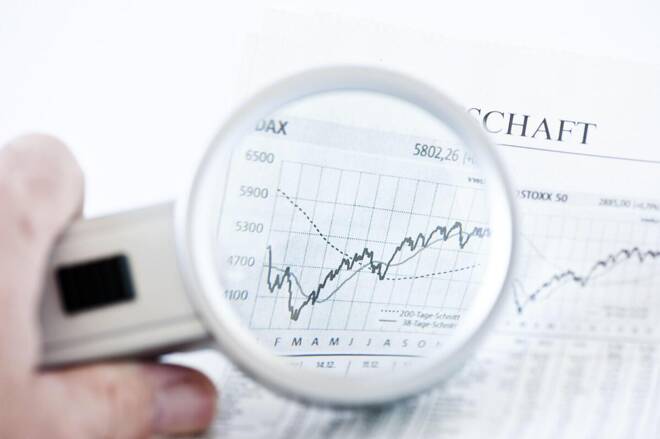Advertisement
Advertisement
DAX Index: Euro Area and US Private Sector PMIs and Corporate Earnings in Focus
By:
Euro area and US Services PMIs will impact market risk appetite. However, corporate earnings also need consideration. Microsoft and Alphabet deliver results.
Highlights
- The DAX gained 0.02% on Monday, ending the session at 14,801.
- On Tuesday, euro area private sector PMIs and ECB President Christine Lagarde will move the dial.
- However, the US Services PMI, corporate earnings, and 10-year US Treasury yields warrant consideration.
DAX Monday Overview
On Monday, the DAX gained 0.02%. After a 1.64% slide on Friday, the DAX ended the day at 14,801.
US Treasury Yields Reverse, Driving Demand for Riskier Assets
Economic indicators took a backseat on Monday, with 10-year US Treasury yields dictating market risk sentiment.
Better-than-expected Eurozone consumer confidence had no impact on the DAX. Investors also brushed aside weaker-than-expected Chicago Fed National Activity Index numbers.
However, a sharp fall in 10-year US Treasury yields delivered late support for the DAX and the broader equity markets. The DAX recovered from a Monday session low of $14,630, with the US equity markets also paring losses.
On Monday, the Nasdaq Composite Index gained 0.27%, while the S&P 500 and Dow saw losses of 0.17% and 0.58%.
The Monday Market Movers
Sartorius AG continued to sit at the rear of the DAX, sliding by 2.42%. Sartorius AG faces intense selling pressure after revising its full-year forecasts. The auto sector also continued to struggle.
Porsche and Volkswagen ended the session down 1.84% and 0.87%. Mercedes Benz Group and BMW fell by 0.50% and 0.27%, respectively. Investors reacted to Volkswagen cutting its profit margin outlook.
Tuesday Focus: Euro Area Private Sector PMIs
German GfK Consumer Climate and prelim October private sector PMIs will garner investor interest on Tuesday.
However, the services PMI figures for Germany and the Eurozone will likely influence the buyer appetite for DAX-listed stocks. A contraction across the German services sector and a more marked contraction in the Eurozone services sector may test risk appetite.
Economists forecast the German Services PMI to fall from 50.3 to 50.0 and the Eurozone’s to hold steady at 48.7.
Later in the session, ECB President Christine Lagarde is on the calendar to speak. The ECB will deliver its interest rate decision on Thursday, exposing the DAX to pre-Thursday jitters.
Beyond the economic calendar, corporate earnings and the Middle East conflict need consideration. While the markets appear hopeful of the Middle East conflict remaining contained, an escalation could refuel fear of a regional conflict.
US Services PMI in the Spotlight
US economic indicators will warrant consideration late in the European session. Prelim private sector PMI numbers for October will draw investor interest. An unexpected pickup in service sector activity could fuel bets on a December rate hike and pressure riskier assets.
Economists forecast the US S&P Global Services PMI to fall from 50.1 to 49.8 in October.
A more hawkish Fed interest rate trajectory would impact borrowing costs and corporate profit margins.
While the economic calendar will provide direction, US corporate earnings will also be in focus. Big names include Coca-Cola (KO), General Electric (GE), General Motors (GM), Microsoft (MSFT), Alphabet (GOOGL), and Visa (V).
The futures markets point to a mixed Tuesday session. The DAX was down 18 points, while the Nasdaq mini was up 56 points
Short-Term Forecast
Euro area private sector PMIs will give investors a bird’s eye view of the Eurozone economy at the start of Q4. While upbeat numbers will ease fears of a prolonged recession, Fears of further Fed rate hikes and the Middle East conflict remain headwinds as investors digest the latest corporate earnings.
DAX Technical Indicators
Daily Chart
The DAX sat below the 50-day and 200-day EMAs, affirming bearish price signals.
A DAX return to sub-14,650 would give the bears a run at the 14,525 support level. Tuesday trends will hinge on the Services PMI numbers and corporate earnings.
Better-than-expected numbers from Germany and the Eurozone would support a move to the 14,957 resistance level.
The 14-day RSI reading of 31.78 suggests a DAX drop below 14,650 before entering oversold territory.
4-Hourly Chart
The DAX remains below the 50-day and 200-day EMAs, reaffirming bearish price signals. A DAX move through the 14,957 resistance level would support a move toward the 50-day EMA.
However, a fall through 14,650 would bring the 14,575 support level into play.
The 32.43 14-4 hour RSI reading suggests a DAX return to 14,650 before entering oversold territory.
For a look at the economic events, check out our economic calendar.
About the Author
Bob Masonauthor
With over 28 years of experience in the financial industry, Bob has worked with various global rating agencies and multinational banks. Currently he is covering currencies, commodities, alternative asset classes and global equities, focusing mostly on European and Asian markets.
Advertisement
